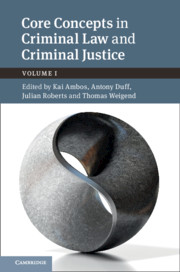1 - Introductory Remarks
from Part I - Introduction
Published online by Cambridge University Press: 19 December 2019
Summary
Criminal law and criminal justice are becoming increasingly globalised. In open societies, the era in which individual jurisdictions developed their own codes, statutes and systems of justice with no regard to other systems and countries is long over. There is a growing desire to develop common approaches to common problems and to learn from the diversity of current practice in different countries. This development has been reinforced by the internationalisation of criminal justice in international and mixed criminal tribunals. However, attempts at trans-jurisdictional discourse are often hampered by mutual misunderstanding. Some problems are linguistic: although English is the new lingua franca in international and comparative criminal law, not all foundational concepts of criminal law and justice originate in the English-speaking world; some of them are rooted in civil law jurisdictions, such as France, Germany and Italy. The translation of these concepts into English is thus subject to ambiguity and potential error: the same term may have different meanings in different legal contexts. As a consequence, critical and theoretical discussions too often take place within the different legal traditions rather than between them: Anglo-American scholars talk to each other, as do those taught in Continental European criminal law traditions; too rarely do they engage seriously with each other across these jurisdictional borders.
- Type
- Chapter
- Information
- Core Concepts in Criminal Law and Criminal Justice , pp. 3 - 14Publisher: Cambridge University PressPrint publication year: 2020

